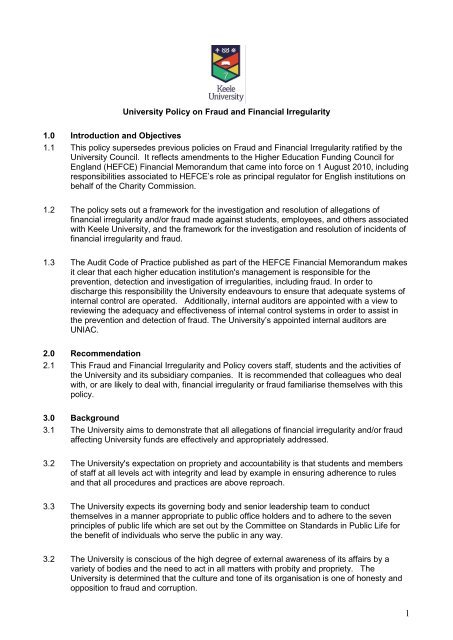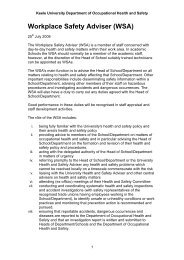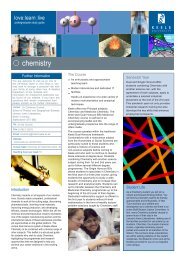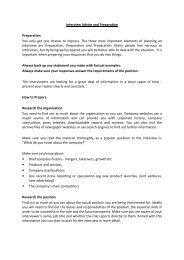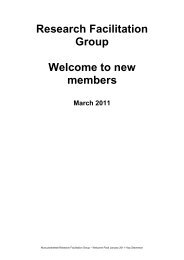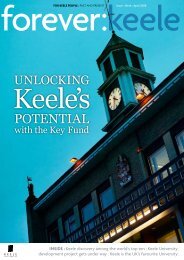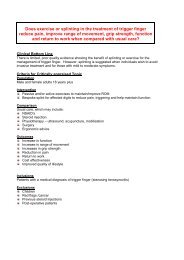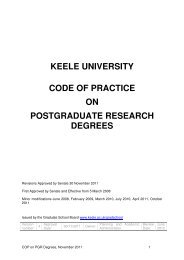Fraud and Financial Irregularity Policy - Keele University
Fraud and Financial Irregularity Policy - Keele University
Fraud and Financial Irregularity Policy - Keele University
Create successful ePaper yourself
Turn your PDF publications into a flip-book with our unique Google optimized e-Paper software.
<strong>University</strong> <strong>Policy</strong> on <strong>Fraud</strong> <strong>and</strong> <strong>Financial</strong> <strong>Irregularity</strong><br />
1.0 Introduction <strong>and</strong> Objectives<br />
1.1 This policy supersedes previous policies on <strong>Fraud</strong> <strong>and</strong> <strong>Financial</strong> <strong>Irregularity</strong> ratified by the<br />
<strong>University</strong> Council. It reflects amendments to the Higher Education Funding Council for<br />
Engl<strong>and</strong> (HEFCE) <strong>Financial</strong> Memor<strong>and</strong>um that came into force on 1 August 2010, including<br />
responsibilities associated to HEFCE’s role as principal regulator for English institutions on<br />
behalf of the Charity Commission.<br />
1.2 The policy sets out a framework for the investigation <strong>and</strong> resolution of allegations of<br />
financial irregularity <strong>and</strong>/or fraud made against students, employees, <strong>and</strong> others associated<br />
with <strong>Keele</strong> <strong>University</strong>, <strong>and</strong> the framework for the investigation <strong>and</strong> resolution of incidents of<br />
financial irregularity <strong>and</strong> fraud.<br />
1.3 The Audit Code of Practice published as part of the HEFCE <strong>Financial</strong> Memor<strong>and</strong>um makes<br />
it clear that each higher education institution's management is responsible for the<br />
prevention, detection <strong>and</strong> investigation of irregularities, including fraud. In order to<br />
discharge this responsibility the <strong>University</strong> endeavours to ensure that adequate systems of<br />
internal control are operated. Additionally, internal auditors are appointed with a view to<br />
reviewing the adequacy <strong>and</strong> effectiveness of internal control systems in order to assist in<br />
the prevention <strong>and</strong> detection of fraud. The <strong>University</strong>’s appointed internal auditors are<br />
UNIAC.<br />
2.0 Recommendation<br />
2.1 This <strong>Fraud</strong> <strong>and</strong> <strong>Financial</strong> <strong>Irregularity</strong> <strong>and</strong> <strong>Policy</strong> covers staff, students <strong>and</strong> the activities of<br />
the <strong>University</strong> <strong>and</strong> its subsidiary companies. It is recommended that colleagues who deal<br />
with, or are likely to deal with, financial irregularity or fraud familiarise themselves with this<br />
policy.<br />
3.0 Background<br />
3.1 The <strong>University</strong> aims to demonstrate that all allegations of financial irregularity <strong>and</strong>/or fraud<br />
affecting <strong>University</strong> funds are effectively <strong>and</strong> appropriately addressed.<br />
3.2 The <strong>University</strong>'s expectation on propriety <strong>and</strong> accountability is that students <strong>and</strong> members<br />
of staff at all levels act with integrity <strong>and</strong> lead by example in ensuring adherence to rules<br />
<strong>and</strong> that all procedures <strong>and</strong> practices are above reproach.<br />
3.3 The <strong>University</strong> expects its governing body <strong>and</strong> senior leadership team to conduct<br />
themselves in a manner appropriate to public office holders <strong>and</strong> to adhere to the seven<br />
principles of public life which are set out by the Committee on St<strong>and</strong>ards in Public Life for<br />
the benefit of individuals who serve the public in any way.<br />
3.2 The <strong>University</strong> is conscious of the high degree of external awareness of its affairs by a<br />
variety of bodies <strong>and</strong> the need to act in all matters with probity <strong>and</strong> propriety. The<br />
<strong>University</strong> is determined that the culture <strong>and</strong> tone of its organisation is one of honesty <strong>and</strong><br />
opposition to fraud <strong>and</strong> corruption.<br />
1
3.3 The staff <strong>and</strong> students of the <strong>University</strong> are an important element in its stance on fraud <strong>and</strong><br />
corruption <strong>and</strong> they are positively encouraged to raise any concerns that they may have on<br />
these issues where they are associated with <strong>University</strong> business or activity.<br />
4.0 Definitions<br />
4.1 There is currently no precise legal definition of fraud, but for the purposes of the<br />
<strong>University</strong>'s policy, the following definitions apply:<br />
• <strong>Financial</strong> <strong>Irregularity</strong> - circumvention of controls which may or may not be fraudulent;<br />
• <strong>Fraud</strong> - deception carried out in order to gain an unfair advantage or to disadvantage<br />
another. The <strong>Fraud</strong> Act 2006 provides for a general criminal offence of fraud.<br />
5.0 Responsibility to Report Suspected <strong>Financial</strong> <strong>Irregularity</strong> or <strong>Fraud</strong><br />
5.1 Effective preventative measures must, of necessity, rely upon the vigilance <strong>and</strong> awareness<br />
of those staff whose work incorporates internal control features. It is the duty of all staff to<br />
notify the Director of Finance or in their absence the Deputy Head (Governance), via their<br />
Head of Department if appropriate. The duty of notification applies to any known or<br />
suspected form of financial irregularity affecting the <strong>University</strong>’s assets, finances, or other<br />
resources.<br />
5.2 All notifications of suspected financial irregularity should be made in writing (in strict<br />
confidence) to the Director of Finance & IT or the Deputy Head (Governance) in their<br />
absence, providing a brief description of the alleged irregularity, the estimated scale of or<br />
scope for loss, any evidence supporting the alleged irregularity, <strong>and</strong> details of the person<br />
under suspicion (the respondent).<br />
5.3 Staff should refer to the <strong>University</strong>’s Whistleblowing <strong>Policy</strong> <strong>and</strong> Procedure for detailed<br />
information on how the <strong>University</strong> h<strong>and</strong>les allegations concerning malpractice in the<br />
administration <strong>and</strong> governance of the <strong>University</strong>.<br />
6.0 Prevention<br />
6.1 The <strong>University</strong> recognises the importance of prevention in its anti-fraud strategy <strong>and</strong> has in<br />
place various measures including denial of opportunity, effective leadership, auditing <strong>and</strong><br />
employee screening. <strong>Fraud</strong> is minimised through usefully designed <strong>and</strong> consistently<br />
operated management procedures which deny opportunities for fraud. In particular,<br />
financial systems <strong>and</strong> procedures take into account the need for internal checks <strong>and</strong><br />
internal control, <strong>and</strong> staff are required to receive training in the operation of all<br />
systems. Additionally, the possible misuse of information technology is prevented through<br />
the management of physical access to terminals <strong>and</strong> protecting systems with electronic<br />
access restrictions where appropriate.<br />
6.2 The <strong>University</strong>'s Audit Committee provides an independent <strong>and</strong> objective view of internal<br />
controls by overseeing Internal <strong>and</strong> External Audit Services, reviewing reports <strong>and</strong> systems<br />
<strong>and</strong> procedures <strong>and</strong> ensuring compliance with the <strong>University</strong>'s <strong>Financial</strong> Regulations <strong>and</strong><br />
the requirements of HEFCE.<br />
6.3 The External Auditor's reviews of financial checks <strong>and</strong> balances <strong>and</strong> validation testing<br />
provide a further deterrent to fraud <strong>and</strong> advice about system development/good practice.<br />
7.0 Detection<br />
7.1 Whilst it is accepted that no systems of preventative measures can guarantee that frauds<br />
will not occur, the <strong>University</strong> has in place detection measures to highlight irregular<br />
transactions.<br />
2
7.2 All internal management systems are designed with detective checks <strong>and</strong> balances in mind<br />
<strong>and</strong> this approach is applied consistently utilising wherever possible the expertise <strong>and</strong><br />
advice of the <strong>University</strong>'s Auditors. The approach includes the need for segregation of<br />
duties, reconciliation procedures, the r<strong>and</strong>om checking of transactions <strong>and</strong> the review of<br />
management accounting information including exception reports.<br />
7.3 Concerns expressed by staff, students or others associated with the <strong>University</strong> which are<br />
expressed in good faith will, as a matter of course, are looked into by the <strong>University</strong> without<br />
adverse consequences for the complainant, maintaining confidentiality wherever possible.<br />
7.4 The <strong>University</strong> views its preventative measures by management, coupled with sound<br />
detective checks <strong>and</strong> balances as its first line of defence against fraud. Audit activity is<br />
however an important defence mechanism also <strong>and</strong> Auditors may be required to use<br />
special techniques on occasions to identify fraudulent transactions.<br />
8.0 Internal Reporting <strong>and</strong> <strong>Fraud</strong> Response<br />
8.1 The <strong>University</strong> recognises the unpredictability of financial irregularity <strong>and</strong> fraud <strong>and</strong> the<br />
disruption which it may cause once identified. It recognises also the need to safeguard its<br />
assets, recover losses <strong>and</strong> secure evidence for legal <strong>and</strong> disciplinary processes.<br />
8.2 In order to meet these objectives <strong>and</strong> to clarify its approach when fraud is suspected, the<br />
<strong>University</strong> has a <strong>Fraud</strong> Response Plan which addresses:-<br />
a) prevention of further loss<br />
b) establishing <strong>and</strong> securing evidence necessary for criminal, civil <strong>and</strong> disciplinary action<br />
c) notifying the HEFCE where necessary<br />
d) recovery of losses<br />
e) sanctions against persons where fraud is proven, including prosecution<br />
f ) policy on references for employees disciplined or prosecuted for fraud<br />
g) reporting within the <strong>University</strong> <strong>and</strong> follow-up action<br />
h) reporting lines<br />
i) responsibility for timing <strong>and</strong> informing the police<br />
j) responsibility for investigation <strong>and</strong> the need to conduct a thorough investigation<br />
k) arrangements for the use of external specialists<br />
l) establishing lines of communication with the police<br />
9.0 External Reporting<br />
9.1 The HEFCE <strong>Financial</strong> Memor<strong>and</strong>um defines a ‘serious incident’ as one which has resulted<br />
in, or could result in, a significant loss of funds or a significant risk to a charity's property,<br />
work, beneficiaries or reputation. HEIs must report serious incidents to HEFCE at the time<br />
when they are identified.<br />
9.2 The reporting of serious incidents relates to HEFCE’s role as both principal charity regulator<br />
for institutions, but also as principal funding body. HEFCE encourages institutions to report<br />
any incident it may deem to be serious even if it does not meet the criteria outlined below,<br />
or in the HEFCE <strong>Financial</strong> Memor<strong>and</strong>um, which details all information that warrants<br />
notification to HEFCE outside normal reporting procedures. If an institution is unsure<br />
whether an incident merits reporting HEFCE recommends that it should be reported<br />
anyway.<br />
3
9.2 The <strong>Financial</strong> Memor<strong>and</strong>um also stipulates that the following specific serious incidents<br />
should be investigated <strong>and</strong> reported to them:<br />
(a) loss of assets through fraud, theft or other cause where the value of the loss is in<br />
excess of £25,000<br />
(b) donations of more than £25,000 from unknown donors, or where the source cannot<br />
be verified<br />
(c) abuse or mistreatment of a charitable beneficiary involved in activities of the HEI<br />
(d) disqualification of a trustee<br />
(e) known or alleged links (other than for bona fide academic reasons) with proscribed<br />
organisations or terrorism; this applies to trustees, staff, students, or anyone else<br />
associated with the HEI.<br />
10.0 <strong>Policy</strong> Review<br />
10.1 The <strong>University</strong> has in place a clear network of systems <strong>and</strong> procedures to assist it in<br />
avoiding opportunities for fraud <strong>and</strong> corruption <strong>and</strong> for dealing with such cases if they<br />
arise. It is determined that these internal arrangements will be regularly reviewed to keep<br />
pace with future developments in both preventative <strong>and</strong> detection techniques <strong>and</strong> with<br />
developments related to the introduction of new systems within the <strong>University</strong>. A<br />
continuous overview of the arrangements <strong>and</strong> developments will be maintained by the Audit<br />
Committee.<br />
10.2 Additionally this policy <strong>and</strong> associated response plan <strong>and</strong> procedures will be reviewed<br />
every three years. This <strong>Policy</strong> was reviewed by Audit Committee in March 2011 <strong>and</strong><br />
ratified by Council in April 2011.<br />
4


